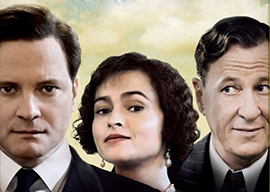
November 30, 2010

In outline, The King’s Speech sounds like a Wayans Brothers spoof of a Weinstein Brothers prestige film: an Oscar-bound movie where the King of England, a victim of society’s prejudice against stutterers, is empowered by an impudent immigrant therapist to overcome his stiff upper lip just in time to rouse his countrymen to defeat Hitler.
Here, though, practice does make perfect. The King’s Speech is delightful: fast-paced, funny, touching, and extraordinarily well-acted.
Veteran TV-movie screenwriter David Seidler (who finally has written a cinema hit at age 73) is aware that overcoming one’s fear of public speaking isn”t an exceptionally edifying Triumph of the Human Spirit story, but it’s something with which almost everybody can identify. The British Royal Family remains of broad interest because it plays out on a grand stage such human-scale dramas as speech impediments and engagements.
The King’s Speech illustrates G. K. Chesterton’s 1905 insight that hereditary kingship is “in essence and sentiment democratic because it chooses from mankind at random. If it does not declare that every man may rule, it declares the next most democratic thing; it declares that any man may rule.” Colin Firth portrays that “anyman” as King George VI (reigned 1936-1952), father of the current queen, a man who was callously raised as the unimpressive spare to the glamorous heir, his older brother Edward VIII.
Firth, who played Mr. Darcy in both Pride and Prejudice and Bridget Jones’s Diary, has the kind of handsome-but-wide face that seems to strike many women as that of the ideal husband to settle down with sometime after age 30. In contrast, as the dashing but unreliable Edward, the high-cheekboned Guy Pearce (Memento) steals every scene, even in this all-star cast.
Sickly, shy, and a bit slow, the little prince had developed a stammer about the time he was forced to convert from left-handedness to right-handedness. After serving bravely in the Royal Navy at the Battle of Jutland in 1916, the Duke of York had few duties in the 1920s other than to make speeches and small talk. Unfortunately, his disfluency (the threat of an upcoming “k””as in “king””would leave him speechless for many seconds) made oral communication painful for both royals and subjects.